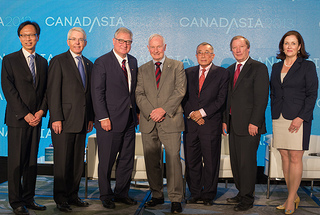 The Pacific Economic Cooperation Council issued its 'Vancouver Statement' at the conclusion of the 21st General Meeting of PECC held in Vancouver during June 4-5, 2013. The Council’s Standing Committee has been reviewing the changes in the geopolitical and economic landscape noting the larger variety of regional cooperation processes and the implications this had for Track 2 engagement.
The Pacific Economic Cooperation Council issued its 'Vancouver Statement' at the conclusion of the 21st General Meeting of PECC held in Vancouver during June 4-5, 2013. The Council’s Standing Committee has been reviewing the changes in the geopolitical and economic landscape noting the larger variety of regional cooperation processes and the implications this had for Track 2 engagement.
The Statement reaffirms PECC’s commitment to open regionalism in the Asia-Pacific. The Council’s members highlighted the role that open regionalism has played in the rapid growth of the region and the continued role that it should play in further strengthening the integration of the region. The Statement highlights the need for APEC economies and our leaders to reaffirm their commitment to open regionalism, regional integration, and structural reforms as means to increase efficiency and growth. As PECC has urged in the past, such growth should be balanced, inclusive, and sustainable.
Since APEC economies now play a leading role in the global economy, we also strongly support APEC leadership for reinvigorating the World Trade Organization and the Group of 20. The Statement also underscores the importance of involving next generation leaders in the setting of priorities for regional cooperation and creating solutions to the challenges facing the world.
PECC has played a vital role in serving as a progenitor and catalyst to many other institutions and initiatives existing today including the APEC and has worked towards achieving open regionalism through different approaches. With the Doha Round negotiations at an impasse, economies are now pursuing regional trading blocs – from the TPP (Trans-Pacific Partnership) and RCEP (Regional Comprehensive Economic Partnership) to the newly emerging Pacific Alliance initiative. These agreements keep the trade agenda moving but there is a danger they could become exclusive blocs unless designed from the outside to welcome new members willing to undertake the same obligations. Another important consideration is that increased income inequality among and within economies jeopardizes support for the liberalization of trade and investment.
“More than three decades on, PECC is constantly changing and staying a step ahead of other regional institutions. PECC’s success is measured not just in numbers and percentages but by the influence we have on shaping policies, by the quality of dialogues generated, and by our sense of what is essentially an Asia-Pacific community,” said Ambassador Don Campbell, Co-Chair of PECC and Chair of the Canadian committee for PECC. “We recognize that the global circumstances have changed enormously in the last few years and through this Vancouver Statement, we are demonstrating our commitment to deepening the regional cooperation for more equitable and inclusive growth across the region,” added Mr. Jusuf Wanandi, Co-Chair of PECC. “We have become much more open to the idea of engaging non-PECC or non-APEC members such as India and Myanmar, we are keen to invest more in involving the next generation leaders in our substantive research programs, and we will be looking for ways to diversify our research products with the aim of widening our appeal and outreach towards a broader audience,” said Mr. Wanandi.
The opening plenary session, 'Key Trends Shaping the Asia-Pacific" examined the latest economic, political, and social trends in the Asia-Pacific, identifying the emerging opportunities and uncertainties in the region. The plenary session was followed by concurrent breakout sessions which covered diverse topics including: infrastructure deficit in the Asia-Pacific, creativity and innovation in Asia, promoting inclusive growth and resilient societies in Asia, green growth, and risks to growth in the Asia-Pacific. Next day plenary sessions addressed Canada's Asia strategy and how economies are responding to the rise of Asia. Thereafter, breakout sessions focused on Canada's contribution to sustainable growth in the Asia-Pacific, and preparation of Canada's next generation to compete in an international environment increasingly influenced by developments in Asia.
PECC General Meetings are open to the wider public and attended also by youth delegates who have been selected by their respective PECC member committees. Thirty graduate and post-graduate students from across the Asia-Pacific and Canada participated in the 21st PECC General Meeting.
For more information about the event, please visit: canadaasia2013.ca.
Photo: His Excellency the Right Honourable David Johnston, Governor General of Canada (center), poses with Canada-Asia 2013 hosts and PECC Co-Chairs. From left to right: Yuen Pau Woo (President and CEO of APF Canada), Dean Connor (CEO, Sun Life Financial), David Emerson (former Minister of Foreign Affairs and International Trade of Canada), David Johnston, Jusuf Wanandi (Co-Chair of PECC), Don Campbell (Co-Chair of PECC), and Jill Price (APF Canada Vice-President, Development and Corporate Affairs). Photo courtesy of Canada-Asia 2013.

